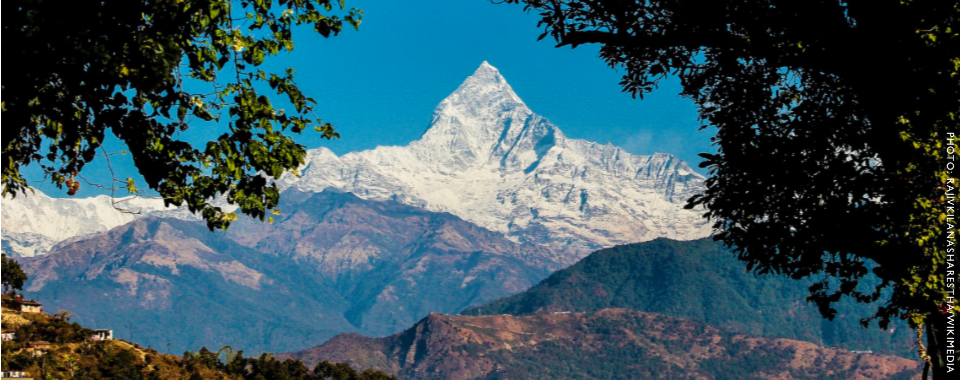BY TRACE CARLSON
Over the past 20 years, Nepal has experienced a decade-long civil war, extensive constitutional and political reforms, and horrendous natural disasters that have affected over 6 million people. Nevertheless, Nepal has demonstrated remarkable resiliency throughout these challenges to emerge as the third most improved country in the world in the 2018 Fragile States Index (FSI). The country’s score improved by 3.1 points from the previous year, making this Nepal’s best-ever score in the FSI. In 2018, Nepal improved on nine of the twelve indicators, seeing marked improvements on economic, political, and foreign policy challenges.
Nepal’s real GDP grew by 7.1 percent in 2017, a remarkable performance that is reflected in the 1.4 point improvement on the FSI’s economy indicator, by far the country’s most improved. The economy rebounded from the 2015 earthquake which caused an estimated US$10 billion in damages – equivalent to almost half Nepal’s GDP – and slowed real GDP growth in 2016 to 0.4%. Economic confidence in 2017 was further boosted by the first legislative, municipal, and village elections in 20 years, strengthening the nascent political order founded on the 2015 constitution. Due in part to the greater optimism and confidence engendered by the successful elections, remittances fell by 1.4% in 2017. Nepal also improved two places on the 2018 Doing Business Index and 10 places on the 2017-2018 Global Competitiveness Report, wherein it reached 88th place, an all-time high for Nepal.
These improvements can be attributed to Nepal’s success in addressing two of its principal concerns identified in the Report: government instability and inadequate infrastructure. The new constitution and successful recent elections have increased confidence in the political system that emerged following the end of the country’s civil war in 2006, while long-planned projects to improve the country’s infrastructure are nearing completion. One such project, the Melamchi Water Supply Project has been upgrading the water and sanitation infrastructure in Kathmandu while simultaneously widening and improving the city’s roads. The country also finished 16 hydropower projects in 2017, providing an additional 150MW of capacity, increasing the installed capacity by 17.5%. Nepal is also the 11th most improved country over the last five years on the Global Food Security Index, even improving its food security score during the 2015 earthquakes. These improvements are reflected in the FSI’s Public Services indicator, which matched the largest improvement by Nepal since the Index began.
Over the course of 2017, Nepal signed two massive Belt and Road deals with China and a Millennium Challenge Corporation (MCC) compact with the United States. Further, Nepal and China signed an MoU to start working on rail linkages between Tibet and Eastern Nepal with the hope of extending the line to India in the future, linking two of the world’s largest markets. The US$500 million MCC compact, awarded in September, will construct 300km of high-voltage transmission lines across the country, including a second cross-border transmission line to India, and will provide a matching fund for maintenance on 300 km roads. These deals represent an economic and diplomatic emergence for Nepal, out of the shadow of neighboring India, which has previously dominated Nepal’s foreign policy.
This was also a landmark year for politics in Nepal with the successful completion of the first municipal and village level elections since the outbreak of the civil war as well as legislative elections which marked only the second time an opposition party has peacefully assumed power. These elections are the result of nearly a decade of difficult governmental restructuring and constitutional reforms, including two Constituent Assemblies, that finally produced a new constitution in 2015. The Kathmandu mayoral election is illustrative of the changing political climate in Nepal and the desire of younger generations to build on the hard-fought gains of the past decade as Ranju Darshana Neupane, the 21-year-old candidate of the youth-led Bibeksheel Nepali party, shocked the city by placing third in the mayoral race.
Despite the improvements, challenges nevertheless remain. Foremost among these is rising tensions with India, exemplified by man-made flooding events and communal issues surrounding the Madhesi community. Over 1 million people were affected and 80% of crops were damaged in 2017 flooding in Nepal’s Terai region, which straddles the India-Nepal frontier. The flooding was largely exacerbated by India’s decision to close 18 dams and embankments along the border during monsoon season to protect its own farmers, a policy decision by India that had a devastating effect on Nepal. Further, tensions between India and Nepal have manifested themselves in protests among the Madhesi communities in the same porous Terai region, over issues of discrimination and under-representation. Proposed provisions in the new Nepalese constitution worsened fears of further discrimination against Madhesi communities on either side of the border, as it imposed stringent citizenship requirements on Indian men marrying Nepalese women, a move that would have significant impacts on the Madhesi community given the degree to which the communities on either side of the border have traditionally intermarried. So serious was this communal issue that Indian Prime Minister Narendra Modi weighed in, cautioning Nepal about taking such a step. The policy was ultimately enacted anyway. In response, the Madhesi community began an unofficial economic blockade in the Terai region, aided and abetted by local Indian officials, causing trade between the two countries to drop by one third compared to the same period the previous year, and resulting in acute shortages of fuel, cooking gas, medicines, and other supplies inside Nepal.
After nearly a decade grappling with constitutional and political reforms, infrastructure challenges, economic development, and a fledgling foreign policy, Nepal has a promising future. Although there are still challenges to overcome, the overwhelming sense of optimism felt among Nepalese citizens in their return to a stable political and economic situation, as well as the youth voter turnout in municipal elections demonstrates that Nepal is trending in the right direction.
